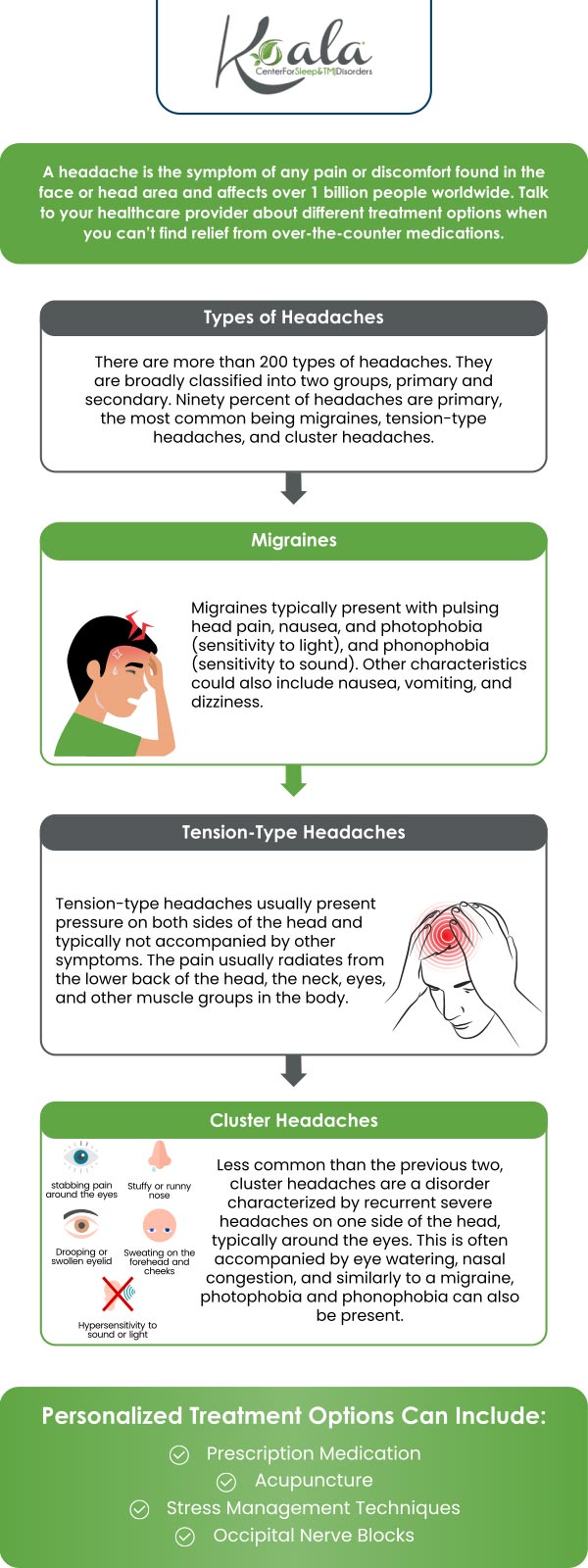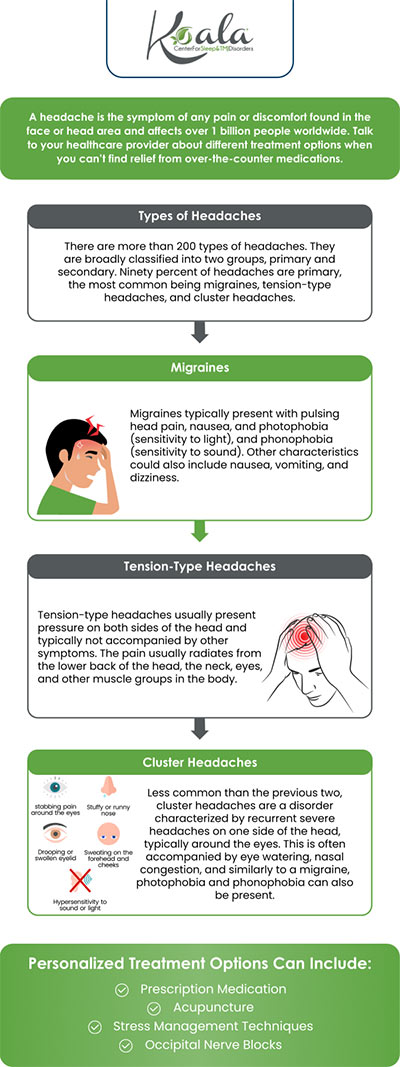The Link Between Overtiredness and Headaches, Anxiety, and Poor Focus
Overtiredness can take a serious toll on your health, often leading to headaches, heightened anxiety, and poor focus throughout the day. When sleep is consistently disrupted, your body and mind struggle to recover, affecting both performance and well-being. At Koala Center for Sleep & TMJ Disorders, our specialists address the root causes of poor sleep with personalized treatment plans, helping patients restore balance, reduce symptoms, and achieve deeper, more restorative rest. For more information, please contact us today or request an appointment online. We have convenient locations in Bloomington IL, Peoria/Dunlap IL, El Paso TX, and Wausau WI.


Table of Contents:
What does “overtiredness” really mean, and how is it different from just being tired?
How can lack of rest impact both the brain and body at the same time?
How does fatigue contribute to tension headaches or migraines?
Why does being overtired increase feelings of stress or anxiety?
Overtiredness is a common but often overlooked concern that can significantly impact sleep quality for both children and adults. At Koala Center For Sleep & TMJ Disorders, we often see patients who struggle with falling asleep or staying asleep—not always because they aren’t tired, but because they are actually overtired. Overtiredness occurs when the body’s natural cues for rest are ignored, causing stress hormones like cortisol and adrenaline to surge. This chemical response can make it harder to relax, leading to feelings of restlessness, irritability, or even unexpected bursts of energy, despite true exhaustion.
For our patients dealing with sleep disorders—such as insomnia, sleep apnea, or TMJ-related pain—overtiredness can become a vicious cycle. Instead of winding down at bedtime, overtired individuals may experience difficulty falling asleep, frequent night wakings, or unrefreshing sleep. In children, overtiredness can result in hyperactivity, tantrums, or trouble settling down, while in adults, it may cause poor concentration, heightened anxiety, or mood disturbances.
At Koala Center For Sleep & TMJ Disorders, we emphasize the importance of recognizing and addressing overtiredness as part of a comprehensive sleep health plan. This includes establishing consistent sleep routines, identifying early signs of tiredness, and addressing underlying sleep or TMJ disorders that may be contributing to chronic exhaustion. By breaking the cycle of overtiredness, we help our patients achieve more restorative sleep, improved daily functioning, and a better quality of life.
At Koala Center For Sleep & TMJ Disorders, we understand that lack of restful sleep can have profound and simultaneous effects on both your brain and body. Sleep disorders—such as sleep apnea, insomnia, and disruptions caused by TMJ (temporomandibular joint) disorders—can prevent you from achieving the restorative rest your body needs.
When you do not get enough sleep, your brain’s ability to function properly is compromised. You may notice problems with memory, concentration, and decision making. Emotional regulation also suffers, often resulting in increased irritability, mood swings, or feelings of anxiety and depression. These symptoms are commonly reported by patients struggling with untreated sleep or TMJ disorders.
The effects on your body are just as significant. Poor sleep weakens your immune system, making you more susceptible to illness. Hormonal imbalances can disrupt your metabolism and appetite, potentially leading to weight gain or difficulty maintaining a healthy weight. Cardiovascular health is also at risk, as inadequate sleep can raise blood pressure and increase the likelihood of heart disease. Additionally, chronic jaw pain from TMJ disorders can further disrupt sleep, creating a cycle of fatigue, pain, and reduced physical performance.
At Koala Center For Sleep & TMJ Disorders, we recognize the critical connection between quality sleep, TMJ health, and overall well-being. Our comprehensive approach addresses both sleep and TMJ concerns to help restore balance to your brain and body—improving your health, mood, and quality of life.
Fatigue plays a significant role in the development and worsening of both tension headaches and migraines—a link that is especially important for patients seeking care at Koala. Many people don’t realize that sleep disorders such as obstructive sleep apnea, insomnia, or poor-quality rest can directly impact headache frequency and severity.
When the body is deprived of restorative sleep, its natural balance is disrupted, leading to increased physical and emotional stress. This state of exhaustion often causes the muscles around the head, neck, and jaw to tense up, which is not only a common trigger for tension headaches but also a hallmark of TMJ (temporomandibular joint) disorders. Persistent muscle tension and jaw clenching can exacerbate headaches, especially for those with TMJ dysfunction.
Additionally, fatigue and sleep deprivation can impair the central nervous system’s ability to regulate pain and maintain healthy levels of neurotransmitters such as serotonin, making individuals more susceptible to migraines. Many patients at our practice report that poor sleep or irregular sleep patterns are major triggers for their migraines. Fatigue can also increase sensitivity to other triggers, such as stress, bright lights, or certain foods, making migraine attacks more frequent and severe.
We understand how vital restorative sleep is for both your physical and mental well-being. Many people don’t realize that conditions like sleep apnea, snoring, and TMJ disorders can lead to sleep deprivation, which in turn can significantly increase feelings of stress and anxiety.
When you suffer from disrupted sleep due to sleep apnea or chronic jaw pain, your body’s stress response system becomes overactive. Stress hormones like cortisol often remain elevated, making you feel more tense or anxious—even in situations that would normally be manageable. Over time, these effects can compound if your sleep problems aren’t addressed.
Quality sleep is essential for emotional regulation and mental clarity. When sleep is interrupted by airway issues or TMJ pain, the parts of your brain that help manage emotions—especially the prefrontal cortex—have trouble keeping the emotional centers in check. This means you may find yourself feeling more irritable, overwhelmed, or anxious, and everyday challenges can seem much harder to handle.
Additionally, sleep deprivation impairs concentration, decision making, and problem solving skills, which can lead to a sense of overwhelm and heightened anxiety. Physical symptoms like increased heart rate and blood pressure, often seen in those with untreated sleep disorders, can further mimic or intensify feelings of anxiety.
This cycle—where poor sleep leads to more stress, and stress makes it harder to sleep—can be especially challenging for individuals with TMJ disorders or sleep apnea. That’s why addressing the root causes of sleep issues is a critical step in managing stress and supporting your mental health.
Visit Koala Center for Sleep for your overtiredness, headaches and anxiety
If you are experiencing overtiredness, frequent headaches, or heightened anxiety, these symptoms may be more interconnected than you realize. Often, disrupted or poor quality sleep is at the root of these issues, affecting both your physical and mental well-being. At Koala, our experienced team specializes in identifying and treating sleep-related problems and TMJ (temporomandibular joint) disorders that may be contributing to your symptoms.
Conditions such as sleep apnea, insomnia, and TMJ disorders are commonly linked to chronic fatigue, headaches (including morning headaches), jaw pain, and anxiety. Our comprehensive approach includes evaluating your sleep patterns, jaw function, and overall health to determine if these conditions are impacting your quality of life. By addressing both sleep disorders and TMJ dysfunction, we can develop personalized treatment strategies that improve your sleep, reduce headaches and jaw pain, and help manage anxiety.
If you’re struggling with overtiredness, headaches, jaw discomfort, or anxiety, consider scheduling a consultation at Koala Center For Sleep & TMJ Disorders. Our compassionate specialists are here to help you uncover the underlying causes and guide you toward better sleep, improved health, and a higher quality of life.

Additional Services You May Need
▸ KoalaKIDZzz®
▸ Sleep Apnea
▸ Snoring
▸ TMJ Disorder
▸ Fatigue
▸ Sleep Disorders
▸ Weight Loss
▸ CPAP Alternative
▸ Oral Appliances




